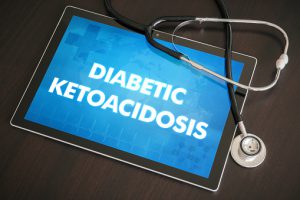Diabetic ketoacidosis (DKA) is a potentially life-threatening condition for those living with diabetes. It occurs when the body doesn’t produce enough sugar (glucose) due to a lack of insulin.
Under normal conditions, insulin serves to help glucose enter the cells that make up our muscles and tissues and provide them with the energy they need. However, when the body can’t produce enough insulin, glucose remains in the bloodstream and fatty acids called ketones begin to build-up. These ketones can eventually spill over into the urine, leading to DKA.
If you have diabetes or you’re at risk of developing diabetes, learn the warning signs of diabetic ketoacidosis — and know when to seek emergency care. DKA signs and symptoms can develop quickly and can include:
- Excessive thirst
- Frequent urination
- Blurred vision
- Flushed, hot, or dry skin
- Loss of appetite or abdominal pain
- Nausea and vomiting
- Weakness or fatigue
- Confusion
- Shortness of breath
Diabetic ketoacidosis can lead to many health complications including low blood sugar (hypoglycemia) levels, low potassium (hypokalemia) levels, and swelling in the brain (cerebral edema). If left untreated, the risks can become much greater. Diabetic ketoacidosis can lead to loss of consciousness and even fatality.
There are many different reasons for DKA to occur. One of the most common causes is the existence of a severe infection or other illness, such as pneumonia or a urinary tract infection. These types of infections can cause the body to produce high levels of hormones that counter the effects of insulin.
Another common cause of DKA for people who are insulin dependent is either missed or inappropriate insulin therapy, which can leave the body with not enough insulin. Other contributing factors for the onset of DKA include extreme dehydration, trauma, heart attack, or alcohol or drug abuse.
The best way to prevent DKA is to commit yourself to managing your diabetes by living a healthy lifestyle and regularly monitoring your blood glucose and ketone levels. If you find that your levels are not what they should be, act quickly and consult with your doctor about adjusting your dosage or seek emergency care.
To schedule an appointment with a doctor at Jamaica Hospital, please call 718-206-7001.
All content of this newsletter is intended for general information purposes only and is not intended or implied to be a substitute for professional medical advice, diagnosis or treatment. Please consult a medical professional before adopting any of the suggestions on this page. You must never disregard professional medical advice or delay seeking medical treatment based upon any content of this newsletter. PROMPTLY CONSULT YOUR PHYSICIAN OR CALL 911 IF YOU BELIEVE YOU HAVE A MEDICAL EMERGENCY.

